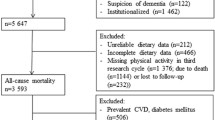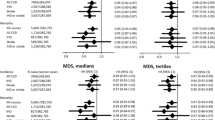Abstract
Background
In cohort studies, often only one baseline measurement of dietary intake is available. This may underestimate the strength of the association with cardiovascular diseases (CVD).
Objective
The main objective is to compare the strength of the association of a Mediterranean style diet with CVD using one baseline measurement of diet versus three repeated measurements over a 10-year period.
Design
We used dietary and lifestyle data of three rounds of the Doetinchem Cohort Study. At baseline, 7,769 persons aged 20–65 years were examined. Diet was assessed with a 178 item validated food-frequency questionnaire and operationalized with the Mediterranean Diet Score (MDS) ranging from 0 to 9. Cox proportional hazards models were used to estimate hazard ratios (HRs) and 95 % confidence intervals (CI). Analyses were adjusted for age, sex, and repeated measurements of smoking, sports, total energy intake, and educational level.
Results
Comparing an MDS of ≥5.5–9 to an MDS of 0–<3.5, baseline MDS was associated with a 23 % lower risk [HR 0.77 (95 % CI 0.53–1.11)] and the updated mean with a 35 % lower risk [HR 0.65 (0.43–0.97)] of a composite of fatal CVD, nonfatal myocardial infarction, and stroke (composite CVD). For fatal CVD, baseline MDS was associated with a 13 % lower risk [HR 0.87 (0.36–2.07)] and the updated mean with a 56 % lower risk [HR 0.44 (0.19–1.05)].
Conclusion
The strength of the association between a Mediterranean style diet and CVD is likely underestimated because most studies so far used only one baseline measurement.
Similar content being viewed by others
References
Hu FB, Stampfer MJ, Rimm E et al (1999) Dietary fat and coronary heart disease: a comparison of approaches for adjusting for total energy intake and modeling repeated dietary measurements. Am J Epidemiol 149(6):531–540
White E, Hunt JR, Casso D (1998) Exposure measurement in cohort studies: the challenges of prospective data collection. Epidemiol Rev 20(1):43–56
Virtanen JK, Mozaffarian D, Chiuve SE, Rimm EB (2008) Fish consumption and risk of major chronic disease in men. Am J Clin Nutr 88(6):1618–1625
Giovannucci E, Rimm EB, Liu Y, Stampfer MJ, Willett WC (2002) A prospective study of tomato products, lycopene, and prostate cancer risk. J Natl Cancer Inst 94(5):391–398
Britton A, Marmot MG, Shipley MJ (2010) How does variability in alcohol consumption over time affect the relationship with mortality and coronary heart disease? Addiction 105(4):639–645
Adebamowo CA, Hu FB, Cho E, Spiegelman D, Holmes MD, Willett WC (2005) Dietary patterns and the risk of breast cancer. Ann Epidemiol 15(10):789–795
Heidemann C, Schulze MB, Franco OH, van Dam RM, Mantzoros CS, Hu FB (2008) Dietary patterns and risk of mortality from cardiovascular disease, cancer, and all causes in a prospective cohort of women. Circulation 118(3):230–237
Kenfield SA, Wei EK, Rosner BA, Glynn RJ, Stampfer MJ, Colditz GA (2010) Burden of smoking on cause-specific mortality: application to the Nurses’ Health Study. Tob Control 19(3):248–254
Ocke MC, Bueno-de-Mesquita HB, Pols MA, Smit HA, van Staveren WA, Kromhout D (1997) The Dutch EPIC food frequency questionnaire II. Relative validity and reproducibility for nutrients. Int J Epidemiol 26 (Suppl 1):S49–S58
Ocke MC, Bueno-de-Mesquita HB, Goddijn HE et al (1997) The Dutch EPIC food frequency questionnaire. I. Description of the questionnaire, and relative validity and reproducibility for food groups. Int J Epidemiol 26 (Suppl 1):S37–S48
Verschuren WM, Blokstra A, Picavet HS, Smit HA (2008) Cohort profile: the Doetinchem Cohort Study. Int J Epidemiol 37(6):1236–1241
Trichopoulou A, Orfanos P, Norat T et al (2005) Modified Mediterranean diet and survival: EPIC-elderly prospective cohort study. BMJ 330(7498):991
De Bruin A, De Bruin EL, Bestand PGS (2003) Linking data of national ambulant register and GBA data: methods, results and quality research (in Dutch). Koppeling van LMR- en GBA gegevens: methode, resultaten en kwaliteitsonderzoek 2003
Beulens JW, Monninkhof EM, Verschuren WM et al (2009) Cohort profile: the EPIC-NL study. Int J Epidemiol 39(5):1170–1178
World Health Organisation (1977) International classification of diseases, 9th revision (ICD-9), Geneva
World Health Organisation (1990) International classification of diseases, 10th revision (ICD-10), Geneva
Merry AH, Boer JM, Schouten LJ et al (2009) Validity of coronary heart diseases and heart failure based on hospital discharge and mortality data in the Netherlands using the cardiovascular registry Maastricht cohort study. Eur J Epidemiol 24:437–447
Sijtsma FP, Meyer KA, Steffen LM et al (2012) Longitudinal trends in diet and effects of sex, race, and education on dietary quality score change: the coronary artery risk development in young adults study. Am J Clin Nutr 95(3):580–586
Lewington S, Thomsen T, Davidsen M, Sherliker P, Clarke R (2003) Regression dilution bias in blood total and high-density lipoprotein cholesterol and blood pressure in the Glostrup and Framingham prospective studies. J Cardiovasc Risk 10(2):143–148
Acknowledgments
The authors would like to thank the field workers of the Municipal Health Services in Doetinchem for their contribution to the data collection for the present study. Project director is WMM Verschuren, PhD. Logistic management was provided by J Steenbrink and P Vissink. The data management was provided by A Blokstra, MSc, AWD van Kessel, MSc, and PE Steinberger. The project was funded by the National Institute for Public Health and the Environment, Bilthoven, the Netherlands.
Conflict of interest
None.
Author information
Authors and Affiliations
Corresponding author
Rights and permissions
About this article
Cite this article
Hoevenaar-Blom, M.P., Spijkerman, A.M.W., Boshuizen, H.C. et al. Effect of using repeated measurements of a Mediterranean style diet on the strength of the association with cardiovascular disease during 12 years: the Doetinchem Cohort Study. Eur J Nutr 53, 1209–1215 (2014). https://doi.org/10.1007/s00394-013-0621-8
Received:
Accepted:
Published:
Issue Date:
DOI: https://doi.org/10.1007/s00394-013-0621-8




